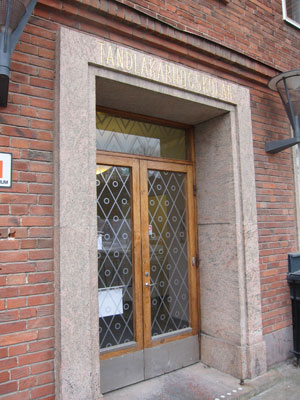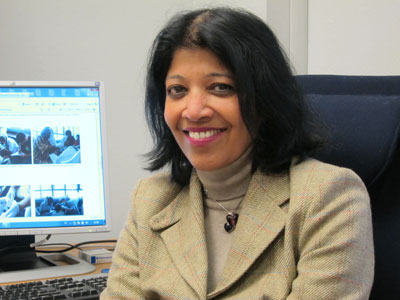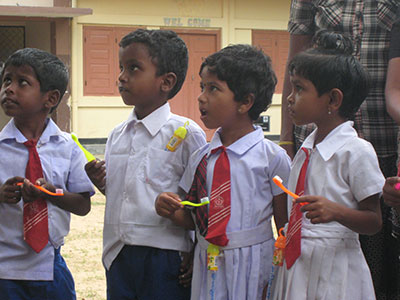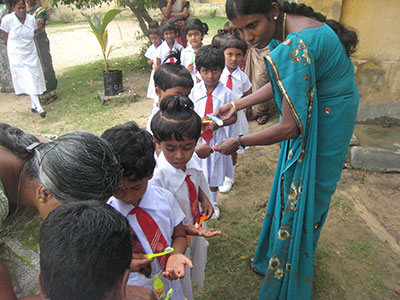Postal address: Malmö University, Faculty of Odontology, SE-205 06 Malmö, Sweden
Visiting address: Carl Gustafs Väg 34
Web page Centre for Oral Health Sciences: http://www.mah.se/english/Schools-and-faculties/Faculty-of-Odontology/
Web Page WHO Collaborating Centre for Education, Training & Research in Oral Health:
http://www.mah.se/capp
Contact persons: Dr. Jayanthi Ramanathan Stjernswärd, Director, phone: +46 (0)40 665 85 40
Dr. Peter Carlsson, Director, phone: +46 (0)40 665 85 38
 The work of the Centre for Oral Health Sciences in Malmö has had an international touch ever since it started in the 1940s. Many of the very first professors were globetrotters who opened the college to international contacts. This includes both contacts in developing countries with widespread dental problems requiring affordable and simple solutions, and industrial countries where they are developing and refining techniques for advanced dental treatment.
The work of the Centre for Oral Health Sciences in Malmö has had an international touch ever since it started in the 1940s. Many of the very first professors were globetrotters who opened the college to international contacts. This includes both contacts in developing countries with widespread dental problems requiring affordable and simple solutions, and industrial countries where they are developing and refining techniques for advanced dental treatment.
The Centre took an early interest in the dental health problems of the Third World, which has become a distinctive research profile. The knowledge of Third World issues built up in the faculty also made the Centre attractive to the World Health Organization, and as a result the Centre attained the status of a WHO Collaborating Centre for Education, Training & Research in Oral Health in 1987. For many years, late Professor Douglas Bratthall was the Project Manager for the so-called WHO Oral Health Country/Area Profile Programme (CAPP) – more information below.
When Lund University started its Programme for East and South-East Asian Studies in 1984 (a programme that 10 years later was transformed into the present Centre for East and South-East Asian Studies, ACE), the odontological contacts in that part of the world proved to be very useful and Prof. Bratthall was selected to become the first chairman of the new programme.
Educational collaboration with South Asia
Dental students have to produce a research paper at the end of their programme, and every year a number of students have chosen South Asia related research project works, that include a fieldwork stay in the region for a period of 2-3 weeks.
 Dr. Jayanthi Stjernswärd (photo) has assisted several students over the years to go to Sri Lanka, Nepal, Pakistan and India. Most of them are then affiliated to local dental institutes such as University of Peradeniya, Sri Lanka, or to NGOs in India and Nepal.
Dr. Jayanthi Stjernswärd (photo) has assisted several students over the years to go to Sri Lanka, Nepal, Pakistan and India. Most of them are then affiliated to local dental institutes such as University of Peradeniya, Sri Lanka, or to NGOs in India and Nepal.
After completion of their final year research projects they have to write and present papers. Here are some of the project papers from recent years:
Palwasha Momand (2011): Oral Health Situation and Dental Education in Pakistan
Demir Cirgic and Pontus Zhu (2011): Cause, methods and complication related to Extraction of teeth in Sri Lanka
Elisabeth Björnhammer and Ingrid Nilsson(2009): A Study on a Group of Patients Seeking Dental Care in Nepal
Malin Björnhammer and Kristina Östling(2009): Prevalence of Tension-type headache and TMD pain among adolescents in India
Joakim Rademark and Arvid Salonen (2008): Oral Submucous Fibrosis in Sri Lanka
WHO Collaborating Centre for Education,
Training & Research in Oral Health
 Initially, the WHO Collaborating Centre for Education, Training & Research in Oral Health at Malmö University covered a wide field from brief expert commissions to projects lasting for several years in developing countries. Since 2006, the main task of the Collaborating Centre (that is has been in existence since 1984) has been to compile and manage a database about oral health and the dental status in all the member countries of the United Nations. Known as the WHO Oral Health Country/Area Profile Project (acronym CAPP), this is available on the Internet.
Initially, the WHO Collaborating Centre for Education, Training & Research in Oral Health at Malmö University covered a wide field from brief expert commissions to projects lasting for several years in developing countries. Since 2006, the main task of the Collaborating Centre (that is has been in existence since 1984) has been to compile and manage a database about oral health and the dental status in all the member countries of the United Nations. Known as the WHO Oral Health Country/Area Profile Project (acronym CAPP), this is available on the Internet.
Link to the database: WHO Oral Health Country/Area Profile Programme
Prof. Bratthall was the Project Manager from 1995–2006. He passed away on the 1st of October, 2006.
In 2010, the Malmö Centre was re-designated by WHO, as a WHO Collaborating Centre for another period of 4 years (the redesignation is done every 4 years). It is one out of a total number of 19 Oral Health related WHO CCs in the World.
See a list of all WHO Collaborating Centres.
It is coordinated by three persons – the two directors, Dr. Peter Carlsson and Dr. Jayanthi Ramanathan Stjernswärd, plus the dentist Gisela Tayanin (of Laotian and Thai origin).
Data included in the CAPP database have been obtained from standard surveys assisted by WHO, or from published literature using comparable methods. In many cases they apply to large groups from the most populous parts of a country providing a working estimate rather than being fully representative. Sources/references are given under every data presented in the relevant country pages, here direct links to the nations of South Asia:
| Afghanistan | Bangladesh | Bhutan | India |
| Maldives | Nepal | Pakistan | Sri Lanka |
Bank of Ideas on Oral Health
Several oral health promotion (education and intervention) programmes have been conducted and many are ongoing worldwide. CAPP therefore presents on its web site what is called a ”Bank of Ideas”, where such programmes have been documented for the past 5-6 years with links to research papers and published articles. They appear in the database under the Oral Health Projects & Reports section. It includes for example articles on Fluoride Use in Asia, and a report on Equity, Social Determinants and Public health programmes.
Go for the Bank of Ideas main page.
The aim of these pages is to present different types of oral health programmes, which have actually been implemented and would be suitable for a particular country, area or region. Several focus on community based projects and programmes, and mostly about prevention rather than treatment. South Asian countries are well represented in the Bank of Ideas.
One report tells about the The Afghanistan Dental Relief Project (ADRP), run by a non-profit organization established in 2003 by Dr James Rolfe, a Dental Surgeon from Santa Barbara, California with the purpose of providing dental care to needy people of Afghanistan and to staff dental facilities with volunteers to train Afghan people in basic dentistry and dental care. Go for the report, written by Zarghuna Momand, a 2008 student at Malmö University as her student research project under the guidance of Dr Stjernswärd.
 On Nepal, some of the programmes conducted under the leadership of Mr. Raj B. Shrestha, Managing Director, Araniko Dental Hospital in Thimi are available. This is Malmö University’s dedicated contact person in the country, and he reports on visits to remote villages, carrying out Basic Oral Health Training Programmes, where health workers teach children to brush teeth. They have a special method to deal with caries in rural areas. Caries prevalence is low, but it remains untreated. Swedish students have also visited and participated in these activities. Go for the Nepal reports.
On Nepal, some of the programmes conducted under the leadership of Mr. Raj B. Shrestha, Managing Director, Araniko Dental Hospital in Thimi are available. This is Malmö University’s dedicated contact person in the country, and he reports on visits to remote villages, carrying out Basic Oral Health Training Programmes, where health workers teach children to brush teeth. They have a special method to deal with caries in rural areas. Caries prevalence is low, but it remains untreated. Swedish students have also visited and participated in these activities. Go for the Nepal reports.
Another interesting case is Sri Lanka. Dental school students there go to underprivileged schools in Kandy and distribute toothbrushes, and explain how to brush teeth, as well as are given treatment. The heart of the programme is Jaffna District, where an Atraumatic Restorative Treatment (ART) Training Programme for school dental therapists has opened in a previously severely war affected area. There is a lot of enthusiasm over the well-functioning project, in which Dr. Jayanti Stjernswärd is personally involved. About 1,000 first grade children are trained to brush their teeth after lunch every school day, and treatment is also provided. More information about the ART programme in Sri Lanka.
Some photos from Velanai, Jaffna, below:

